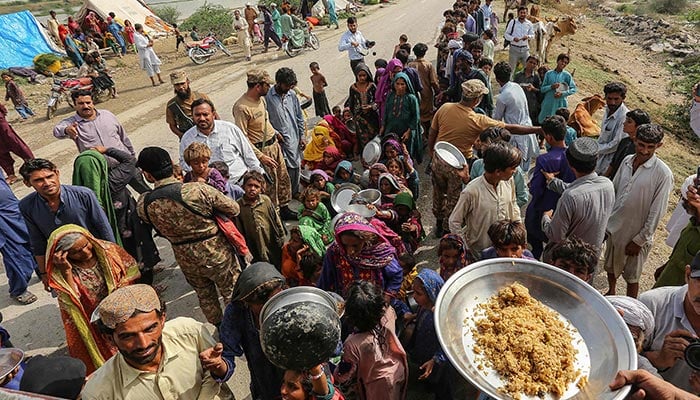What items do flood affectees need right now?
Here's a list of items to consider sending to the victims or dropping off at camps making collections
Around 498,833 flood affectees are currently residing in relief camps in flood-hit areas in Pakistan. Among the 116 districts impacted, 66 have been declared ‘calamity hit’. As the number keeps growing, their needs for essential items, too, continues to increase.
Government agencies, military, local and national organisations, and NGOs have been busy providing relief to victims, some individuals have also been stepping up to lessen the impact of the calamity. But reportedly, some contributions also include perishable food and other low-priority items which may eventually never reach their destination or remain useless for those residing in relief camps at present.
To ensure the provision of relief and rehabilitation for flood affectees, the government requires over Rs72 billion. According to the initial tender assessment report, over Rs7 billion is required in cash relief, while nearly Rs9 billion is needed to provide non-food items, and nearly Rs2 billion has to be spent on medical expenses.
Saving cattle requires over Rs9 billion, while buying equipment to speed up the relief process nearly Rs5 billion should be in place. Reconstruction of overall infrastructure and around 82,000 homes requires Rs41 billion, Independent Urdu reported.
So before you decide to contribute to the ongoing relief efforts across the country, here is a list of items to consider sending to the victims or dropping off at camps making collections:
- Clean drinking water
- Dry fuel such as wood, kerosene oil etc
- Dry eatables (As cooked food might perish or be only useful one time)
- Dry milk (for children) and boxes of liquid milk
- Linen sheets instead of blankets and duvets
- Stitched clothes which can be readily worn
- Plastic shoes as stitching of regular shoes is useless amid stagnant flood water
- Sanitary pads (with disposing wrappers) or cloth napkins for female affectees
- Raw food items such as rice, flour, and lentils for people stuck in homes due to flooding outside
- Dry ration such as roasted black chana and dates
- Dry fodder for cattle
- Tents
- Cooked food can only be sent to people who are residing closer to relief camps and can readily receive contributions with lesser chances of the items expiring
-
Security forces gun down 30 terrorists in multiple IBOs in KP: ISPR
-
MQM-P calls for new province in Sindh
-
US report validates Pakistan military edge over India: PM
-
Banned TTP poses serious threat to Pakistan security: UNSC panel
-
CM Afridi clarifies remarks on by-poll after ECP requests army deployment
-
Dubai sees 3.2m Pakistani passengers in 2025 as airport sets new milestone
-
Security forces kill 23 Indian proxy terrorists in KP's Kurram
-
Pakistan to construct island to boost oil exploration: report












